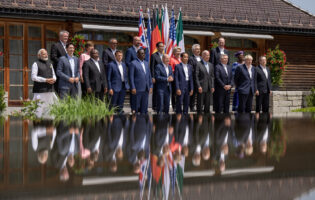The FRG’s Founding Pillars Today
On May 18, 2009, AGI held a conference on “The 60th Anniversary of the Federal Republic of Germany: Its Founding Pillars Today,” generously supported by the Transatlantik-Programm der Bundesregierung der Bundesrepublik Deutschland aus Mitteln des European Recovery Program (ERP) des Bundesministeriums für Wirtschaft und Technologie (BMWi), the Draeger Foundation, and Deutsche Lufthansa AG. The event was also supported by the AGI Foreign & Domestic Policy Program, the Business & Economics Program, and the Society, Culture, & Politics Program. Part of a larger AGI project on the 60th anniversary of the Federal Republic of Germany and the 20th anniversary of the fall of the Berlin Wall, the three panels of the conference examined the relevance of important pillars of the founding of the Federal Republic – the German-American relationship, the German Basic Law, and the social market economy – to today’s world.
The first panel brought together different generations of eastern and western Germans to examine their different narratives and experiences pertaining to German-American relations. In East as well as West Germany, President Reagan had a strong influence on society and unintentionally galvanized the German peace movement in the West. Mikhail Gorbachev’s rise to power in the Soviet Union, followed by a gradual liberalization of policies and Reagan’s anti-communist rhetoric, combined to give East Germans the feeling of being on the side of the “better” superpower. The fall of the Berlin Wall required an immense adjustment of German foreign policy, an adjustment that the country is still making today. While the U.S. played a significant role in making the unification of Germany and ultimately Europe a reality, this role has been largely excluded from the European narrative. In the emergence of a European narrative and identity, two narratives are waning in Germany: the East German and the American narrative. The emerging European narrative and identity is not yet coherent, but by painting a bright European picture (sometimes brighter than the reality) and down playing opposing European forces, Europe tries to forge a common identity. Yet, sometimes this identity is forged by opposing the U.S. rather than detailing what Europe stands for.
Historical differences still have an impact today. During the Cold War, Germany and the U.S. disagreed on evaluating the peace movement in Poland, with the U.S. embracing a potential peaceful change and Germany wary of being embroiled in a potential conflict. A repetition of this disagreement over Poland (and eastern Europe) and Russia can be seen today: Germany would like to engage Russia and is – among other reasons – hesitant to commit to NATO membership for Ukraine and Georgia; the U.S. sometimes still evaluates the situation in Cold War terms of Germany falling into Russia’s “trap.” The wars in Iraq and Afghanistan have strained the German-American relationship in particular and the transatlantic relationship in general. While the deployment of troops to Afghanistan was initially supported by the German population, the political elite has been inadequate in explaining the cause for German troops stationed in Afghanistan and the need for Europeans to do more. Impacting the German deployment is also a constitutional idea of using the military, which differs from the U.S.
The second panel analyzed this difference as well as the the German and American high courts and the German Basic Law (Grundgesetz). One of the main features of the Federal Republic of Germany at its founding was a strong emphasis on the rule of law. An extensive list of fundamental rights was included in the Basic Law, guarded by a strong Constitutional Court, which is a powerful judicial body since its jurisdiction is more broadly framed than in any other country and every citizen can lodge a complaint before it. The Constitutional Court is very popular in Germany. While it normally refrains from directly challenging the policy determinations by the Federal Government, it frequently adds guidelines to be followed in the implementation and it definitely wishes to take part in the framing of the great decisions in the field of foreign policy.
Modern Germany’s deeply embedded reticence toward the use of force, which consistently places it in conflict with America’s more muscular vision of trans-atlanticism, has both roots and expression in the Basic Law. The law places several constraints on the use of force, such as the use of the Bundeswehr for defensive purposes only, and the Constitutional Court has decided in recent cases that the Bundeswehr’s deployment outside of the NATO-area needs the parliament’s approval. Thus, Germany’s use-of-force regime might give the lie to the persistent realist argument that force cannot be constrained by law. The Basic Law has made the use of force in Germany almost exclusively a question of politics, democracy, and law. The rule of law is considered one of the most important principles in Germany, which explains the legal approach Germany takes with most problems. The war in Afghanistan, however, is not a legal question, but rather a political one. ISAF operates under a UN mandate; the number of the troops, however, is a question of political will.
After a luncheon keynote speech on “Germany at 60: Future Challenges and Choices” by Wolfgang Gerhardt, MP and Chairman of the Board of Directors, Friedrich Naumann Foundation for Freedom, the third panel examined the relevance of Germany’s Ordnungspolitik and social market economy today in light of the current economic and financial crisis. The German economy is very export dependent – making it especially vulnerable to the decrease in global demand. Thus, while there was a delay, the German economy has begun to feel the impact of the global economic crisis and the economy is shrinking, with rising unemployment. Crisis management in Germany has mirrored this slow start. Four reasons account for this delay: First, an initial belief that only the U.S. economy was affected. Second, Germany is facing an upcoming election and the Grand Coalition is increasingly impaired by election rhetoric. Additional international divisions in the CDU, one of the coalition partners, make finding a consensus difficult. Third, Germany relies in times of economic crisis on its automatic stabilizers such as unemployment benefits and compensation for “short work” (Kurzarbeit). Fourth, Germany believes that its social market economy, which couples ordoliberalism with a welfare state, is not the cause but the solution to the economic crisis. Germany has begun to adapt its strategy by adopting several measures to stimulate the economy. Three key aspects of this approach can be determined: One, Germany aims at creating a balanced budget, reflecting a belief that increased government fuels inflation and does not spur growth. Second, it is not increased consumption but increased investment in infrastructure that will stimulate the economy, as a one-time tax rebate would just be saved by Germans. Third, regulation is important to control financial markets.
Yet, even the German social market economy is facing an increased disparity between income classes and increased dissatisfaction with the economic situation and the political system. The idea behind social market economy is to provide prosperity for all is currently at stake. Globalization questions if a state can protect its citizens and provide them with economic welfare. However, even with globalization, OECD member countries’ GDPs have remained fairly constant over the last two decades, giving an indication that states still have the ability to influence their economic policy and welfare. Between 1950 and 2000 the German economy faired exceptional well. The year 2000 saw a shift in German economic policy toward the Anglo-Saxon model. In order to sustain a highly developed country and economy, high taxes are also required, which should be invested smartly in education and other infrastructure (the Scandinavian countries provide a good example in that regard). Very low taxes, as are prevalent in the U.S. for example, are insufficient in providing for a highly developed state and high deficits are the consequence.
Many analysts have characterized the German response to the economic crisis as “too little, too late.” Yet if one takes the automatic stabilizers mentioned above into account and compares the German response to the U.S., very little actual difference can be detected in size and tempo. The financial crisis, which at first was thought to be limited to the U.S., has also engulfed Germany. The German Landesbanken, an outdated institution, have been a source of instability by spreading their distress to other banks. The German consumption growth has never lived up to forecasts, while the German savings rate has always been higher than the American savings rate. Germany’s dependence on its exports is especially problematic in light of the lack of diversity of its exports. The composition of its exports has remained virtually unchanged in the past decades. If consumer and exports both fail as a source of economic growth, the question is what could replace them; a question which has not been adequately addressed in Germany. This also points to a bigger source of instability for the German economy than just the current financial and economic crisis.
…………………………………………………………………………………………..
AGI is grateful to the Transatlantik-Programm der Bundesregierung der Bundesrepublik Deutschland aus Mitteln des European Recovery Program (ERP) des Bundesministeriums für Wirtschaft und Technologie (BMWi), the Elfriede Dräger Memorial Foundation, and Deutsche Lufthansa AG for their support of this conference. The event is also supported by the AGI Foreign & Domestic Policy, Business & Economics, and Society, Culture, & Politics Programs.







